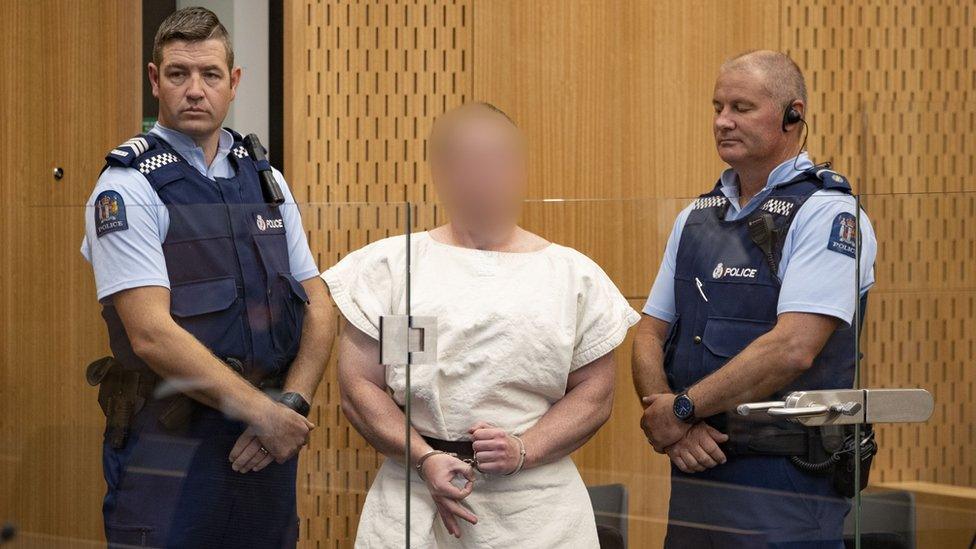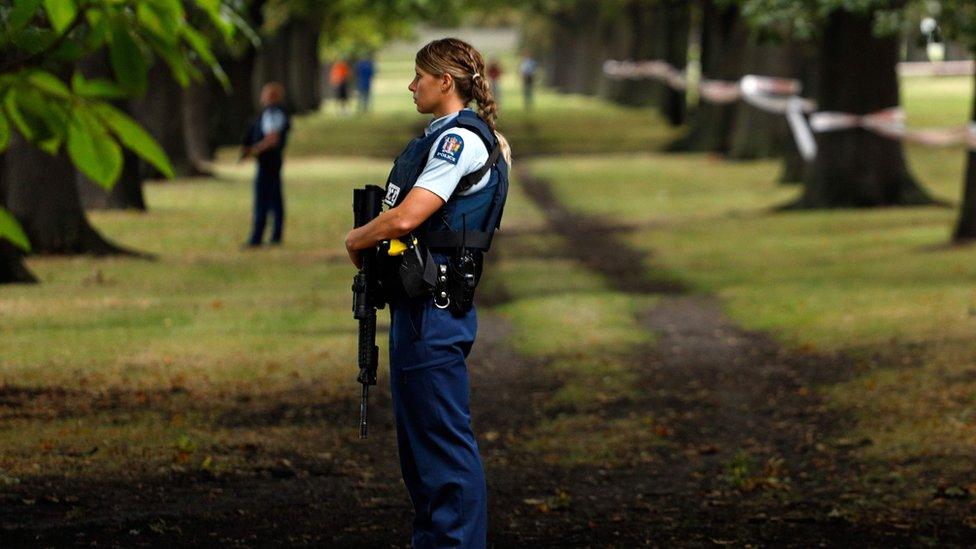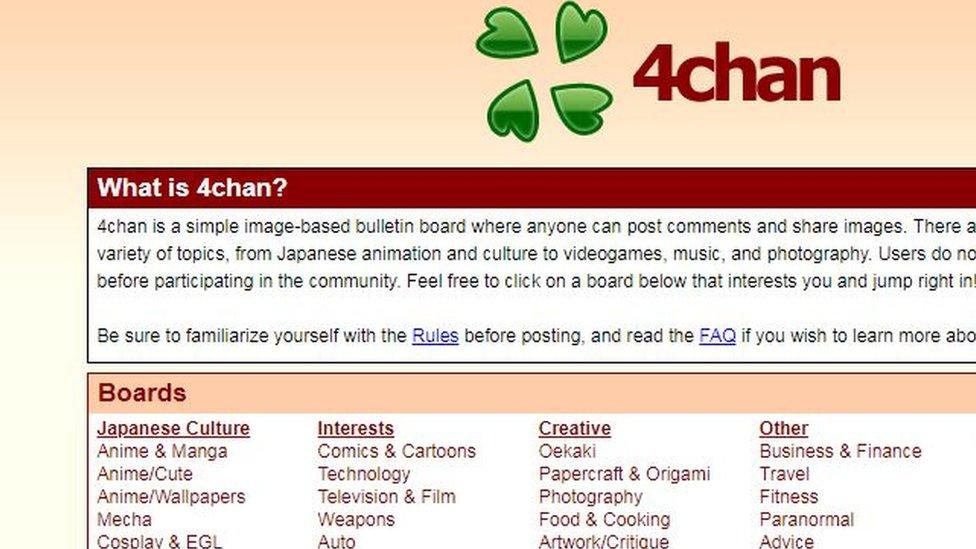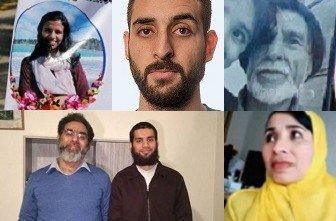Christchurch shootings: The rising new threat of far-right violence
- Published

The suspect flashed a hand sign as he appeared in court on Saturday charged with murder
The man accused of the Christchurch shootings left a trail of references to online culture and extremist alt-right ideology.
When he first appeared in court, Brenton Tarrant flashed an "OK" hand sign.
The gesture was described in some accounts as a white nationalist symbol, but perhaps more accurately could be called a trollish gesture. It is used by extremists, but also by a range of conservatives, far-right figures and the alt-right - a disparate group of activists who congregate on extreme message boards.
A document posted shortly before the shooting and widely credited to the suspect, indicates the author is steeped in the alt-right's toxic culture.
Online, white nationalist ideology hides under layers of irony, often allowing its proponents to duck accusations of extremism while actively spreading hateful language and memes.
Cultural references
Potential clues to the suspect's ideology and inspiration also appear in a live-streamed video which social networks have struggled to completely take down.
The written document was posted on the extreme message board 8chan shortly before the attack began on Friday. It has been called a "manifesto" but that term rather grandly overstates a confused jumble of thoughts and misinformation which rambles on for 74 poorly-written pages.

Beyond Today podcast: Christchurch: how do you find the terrorists among the trolls?
BBC Trending radio: What is 4chan?

In it, the author describes the conservative activist Candace Owens as a key influence. While Owens has repeated claims about declining birth rates and dubious statistics about population growth in European countries, her influence over the suspect is doubtful considering his committed opposition to minorities in Western countries and the fact that Owens is an African-American.
The document also includes an internet-famous joke - a piece of "copypasta", or a block of text that has been copied and pasted from elsewhere. The joke involves a US "Navy Seal" who claims to be posting on 4chan's extreme /pol/ (short for "politically incorrect") message board.
Elsewhere in the document, the writer says that popular video games taught him about ethno-nationalism and violence, before immediately dismissing that idea.
All of these appear to be sick "jokes" - not the laugh-out-loud funny kind but rather the internet meme kind, designed to make it difficult for people to glean his true meaning.
Difficult - but not impossible.

Police officers stand guard near the scene of the deadly shooting in New Zealand
'White genocide' conspiracy theory
At the start of the document and throughout, the author refers to a conspiracy theory central to the new brand of far-right extremism springing from the alt-right: that there is a grand plan to eliminate the "white race" through a combination of immigration and interbreeding.
It's a fiction that plays into the paranoia of the hardcore alt-right, and relies on false assumptions about fixed, sharply genetically defined racial groups, bogus and distorted statistics, and the racist "one-drop" theory from early 20th Century America: the idea that any amount of racial interbreeding negates white racial heritage.
The bizarre conception of a monolithic genetic "white" culture under worldwide attack is a mainstay of the alt-right - although most of the amorphous movement's leaders would outwardly denounce specific acts of violence like the attack in Christchurch.

You may also be interested in:

The movement's foot soldiers are less inhibited. Shortly after the attack, on the nearly-anything-goes message boards 8chan and 4chan, there were a few scattered thoughts of condolence for the victims. But they were swamped by waves of vile abuse, extremist celebration of the attacks, exhortations to more violence and worries about how the attack would negatively affect white nationalist causes.
At the same time, alt-right and relatively less extreme activists speculated that mainstream media outlets would take the entire "manifesto" document at face value.
That didn't really happen. Robert Evans, writing for the investigative news site Bellingcat, external, sounded an early alarm shortly after the attacks, and wrote that the document was a trap laid for journalists.
"There is truth in there, and valuable clues to the shooter's radicalization, but it is buried beneath a great deal" of trolling (Evans himself uses a more specific, scatological, term).
Local news outlets including Radio New Zealand and The New Zealand Herald steered clear of reporting on the document in any detail in the hours immediately after the attacks. At the same time, reporters from the international mainstream press - outlets like The New York Times, external and The Atlantic, external - easily saw through the apparent misinformation.

Should police be on 8chan?
One question raised in the aftermath of the attack is: Why aren't the authorities doing more to monitor sites like 4chan and 8chan to pick up on potential extremist activity?
Setting aside the difficulty of tracing people who use the completely anonymous message boards, even constant monitoring might not be effective. This is because of the sheer volume of material posted, which includes near-constant violent language and threats.
According to web statistics site Alexa, 8chan is among the top 5,000 websites in the world, external, even though it does not show up in Google results. 4chan, which is among the top 1,000, external, claims to host 1 million new posts per day and attract nearly 28 million monthly unique visitors.
The chans are places where racial slurs and exhortations to violence and suicide are not just common, but form the fundamental language by which users communicate.
On the slices of 4chan and 8chan devoted to politics (there are many other sections devoted to less extreme parts of internet culture), there is a near total dehumanisation of victims of terror attacks - and everyone else.



Death of 'irony'
Anyone looking from the outside might have difficulty separating the often-shocking irony from authentic red flags - posts like the one made shortly before the Christchurch attacks.
Alt-right activists have used this irony as both a sword and a shield - to poke their liberal enemies who take their words at face value and to deny responsibility for egging on murderers and white nationalist terrorists.
For instance, the idea of turning the "OK" gesture into a white nationalist signifier was floated in early 2017, external. The anonymous poster - on 4chan, everyone is an anonymous poster - outlined a plan to create fake accounts that would supposedly trick "leftists" into denouncing a common, everyday hand gesture, and thus open themselves to ridicule.
Many people on social media took the bait. At the same time, far-right activists and conservatives started flashing the "OK" sign more frequently - as did hardcore white nationalists.
Death toll rising
When the alt-right first came to prominence on the coattails of Donald Trump's election campaign, its cheerleaders on right-wing websites were able to dismiss concerns about the movement, external as overreaction by left-wing activists and the mainstream media.
But that was before the full extent of the movement's violent fringes had completely come to light.
According to a recent study from the US-based Southern Poverty Law Center, more than 40 murders have been committed by people with alt-right links, external since 2014. Some of the more well-known incidents include the murder of a peaceful protester in Charlottesville, Virginia, a 2017 double murder in Portland, Oregon, and a massacre at a synagogue in Pittsburgh last year.
And now, in Christchurch, the alt-right death toll has more than doubled.
Have a story for us? Email BBC Trending , external
You can follow BBC Trending on Twitter @BBCtrending, external, and find us on Facebook, external. All our stories are at bbc.com/trending.